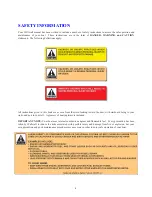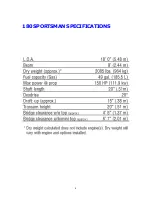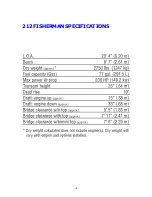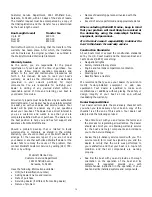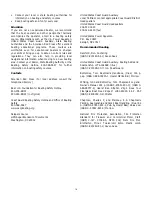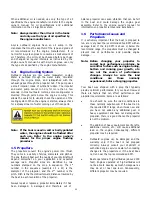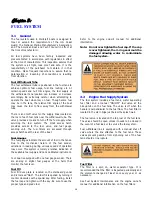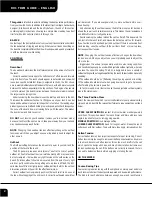
Boat Owner Responsibilities:
• Sit down with your dealer and a review the terms of
all warranties. Complete the Wellcraft, engine and
major component warranty registration cards and
mail them to the manufacturers.
• Fill out the boat information form located in this
manual.
• Inspect the boat at the time of delivery and review
the pre-delivery service record form with your
dealer. The record should be signed by you when
the orientation is complete and you are satisfied
with the operation of all systems.
• Read the boat and equipment owner’s manuals and
operate the boat and all equipment as instructed.
• Read and follow the engine manufacturer’s
instructions for initial inspection, break in, and
service.
• Schedule the 20 hour service and make sure all
periodic maintenance is performed as outlined in the
boat, engine, and component owner’s manuals.
• Know your boat and the rules of the road before you
use your boat.
Important: Make sure that your dealer checks the
engine alignment during your boat’s
commissioning and at the 20-hour checkup. The
engine alignment check should be performed in
accordance with the recommended procedures as
stated by the engine manufacturer in your engine
owner’s manual. Failure to do so could result in
drive train damage which is not covered under
the warranty.
• We recommend that you reference your engine
warranty certificate for initial inspection and service
requirements.
Product Changes
Wellcraft is committed to the continuous improvement of
our boats. As a result, some of the equipment described
in this manual or pictured in the catalog may change or
no longer be available.
Wellcraft reserves the right
to change standard equipment, optional
equipment and specifications without notice or
obligation.
If you have questions about the equipment
on your Wellcraft, please contact your dealer or the
Wellcraft Customer Service Department.
Discharge of Oil
The Federal Water Pollution Control Act prohibits the
discharge of oil or oily waste into or upon the navigable
waters of the United States or the waters of the
contiguous zone if such discharge causes a film or sheen
upon or a discoloration of the surface of the water or
causes a sludge of emulsion beneath the surface of the
water. Violators are subject to a penalty of $5,000.00.
Disposal of Plastics & Other Garbage
Plastic refuse dumped in the water can kill fish and
marine wildlife and can foul boat propellers and cooling
water intakes. Other forms of waterborne garbage can
litter our beaches and make people sick. U.S. Coast
Guard regulations prohibit the dumping of plastic refuse
or other garbage mixed with plastic into the water
anywhere, and restrict the dumping of other forms of
garbage within specified distances from shore.
Marpol Treaty
Boats 26 feet or longer must display a sign stating the
disposal regulation of the Federal Water Pollution
Control Act. The U.S. Coast Guard has issued these
regulations to implement Annex V of the International
Convention for the Prevention of Pollution from Ships,
1973, commonly known as Annex V of the Marpol
(Marine Pollution) Treaty 73/78. They apply to all U.S.
boats wherever they operate (except waters under the
exclusive jurisdiction of a State) and foreign boats
operating in U.S. waters out to and including the
Exclusive Economic Zone (200 Miles.) It is important to
know these regulations and adhere to them.
The regulations require U.S. recreational boaters, if your
boat is 26 feet or more in length, to affix one or more
USCG Trash Dumping Restrictions placards to your boat.
The placard warns against the discharge of plastic and
other forms of garbage within the navigable waters of
the United States and specify discharge restrictions
beyond the territorial sea. (The territorial sea generally
ends three nautical miles from the seashore.) In
addition, the placard must contain the warning that a
person who violates these requirements is liable to civil
($25,000) and criminal (imprisonment) penalties. The
placard also must note that State and local regulations
may further restrict the disposal of garbage.
Operators shall display one or more placards in a
prominent location and in sufficient numbers so they can
be observed and read by crew and passengers. These
locations might include embarkation points, food service
areas, galleys, garbage handling spaces and common
deck spaces frequented by crew and passengers. We
recommend that these placards be installed on all boats.
The placards may be purchased from local marinas, boat
dealerships and marine equipment suppliers. A special
placard is available for boats operating on the Great
Lakes.
Important: It is illegal to discharge waste from your
marine sanitary device (toilet) into the water in most
areas. It is your responsibility to be aware of and adhere
to all local laws concerning waste discharge. Consult
with the Coast Guard, local marina or your dealer for
additional information.
14
Summary of Contents for 180 Sportsman
Page 2: ...2...
Page 4: ...4...
Page 7: ...180 FISHERMAN SPECIFICATIONS 7...
Page 8: ...180 SPORTSMAN SPECIFICATIONS 8...
Page 9: ...202 FISHERMAN SPECIFICATIONS 9...
Page 10: ...212 FISHERMAN SPECIFICATIONS 10...
Page 18: ...18...
Page 39: ...SAFETY LABELS 2601 1124 39...
Page 40: ...180 FISHERMAN 180 SPORTSMAN CAPACITY LABELS 40...
Page 41: ...202 212 FISHERMAN CAPACITY LABELS 41...
Page 61: ...Appendix A SCHEMATICS 180 FISHERMAN INSTRUMENT PANEL 61...
Page 62: ...Appendix A SCHEMATICS 180 SPORTSMAN INSTRUMENT PANEL 62...
Page 63: ...Appendix A SCHEMATICS 202 212 FISHERMAN INSTRUMENT PANEL 63...
Page 68: ...Appendix A SCHEMATICS 180 FISHERMAN 180 SPORTSMAN TRAILER DRAWING 68...
Page 69: ...Appendix A SCHEMATICS 202 212 FISHERMAN TRAILER DRAWING 69...
Page 70: ...Appendix A SCHEMATICS 180 FISHERMAN OVERHEAD LAYOUT 70...
Page 71: ...Appendix A SCHEMATICS 180 SPORTSMAN OVERHEAD LAYOUT 71...
Page 72: ...Appendix A SCHEMATICS 202 FISHERMAN OVERHEAD LAYOUT 72...
Page 73: ...Appendix A SCHEMATICS 212 FISHERMAN OVERHEAD LAYOUT 73...
Page 77: ...MAINTENANCE LOG 77...
Page 78: ...MAINTENANCE LOG 78...
Page 80: ...Appendix D BOAT ACCIDENT REPORT 80...
Page 81: ...81...
Page 87: ...Appendix F TROUBLESHOOTING GUIDE 87...
Page 88: ...TROUBLESHOOTING GUIDE 88...
Page 89: ...TROUBLESHOOTING GUIDE 89...
Page 90: ...TROUBLESHOOTING GUIDE 90...
Page 91: ...TROUBLESHOOTING GUIDE 91...





